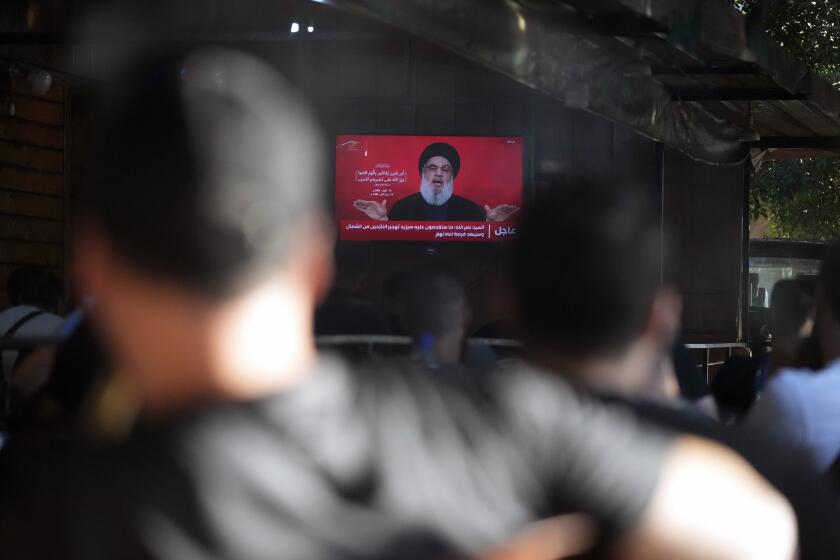Sahara Poll May Be Key to Home for Exiles
The empty bleakness here in the Algerian far west, a dun-colored world of sand and rock, is styled by the Arabs of the Sahara as the “desert of deserts.” Summer temperatures run to 120 degrees, baking the stones. Sandstorms lash the terrain, the tiny, fine particles working their way into eyes, noses, throats and lungs. Flies hover hungrily over each living being, thirsty for sweat and blood.
No one lives here by choice. This town, if it could be called that, is a dusty shambles of white concrete and mud brick. Most of the residents are Algerian soldiers, officers and their families, sent no doubt as punishment or because they knew no one in headquarters who could arrange a more pleasant duty for them. As they stand vigilant against the troops of regional rival Morocco, somewhere across the featureless frontier, it is a place to be endured, not enjoyed.
It was on this barren landscape that Algeria allowed 80,000 uprooted tribesmen to settle in 1975. They were the Sahrawis, refugees from nearby Western Sahara, running from an army of Moroccan troops sent to occupy that former Spanish colony.
Since then, a generation of Sahrawis has grown up near here in a desert prison, dependent almost entirely on charity to survive. The exiles live in tents, read by kerosene or solar lamps, maintain five immaculately clean camps and yearn for the day they can return to their disputed homeland.
“For us, it is not a dream and it is not an illusion,” insists Bechir Madi, crouched over a glass of sweet tea in a hut in the Smara camp. Madi arrived in Tindouf as a young man in December 1975. Now, he is married with four children. His dark hair is peppered with gray. Yet he is not discouraged.
“After 24 years, we are still surviving and we still exist,” he says. “We are coming closer and closer to our goal.”
Western Sahara--102,000 square miles of desert on the west coast of Africa, nestled between Morocco and Mauritania and bordered on the east by Algeria--has been in dispute ever since colonial power Spain, then preoccupied by the death throes of longtime dictator Gen. Francisco Franco, decided abruptly in 1975 to pull out without holding a promised referendum on independence.
Morocco claimed that the area, then known as Spanish Sahara, was historically a part of “greater Morocco.” In an extraordinary march southward in November 1975, 350,000 civilians and Moroccan troops seized the northern two-thirds of the colony in the name of King Hassan II. Mauritania took the other third.
As for the indigenous Sahrawis, they were routed to Algeria. Eventually, they collected themselves and, backed by the Algerian and Libyan governments, began to fight back as the Polisario Front guerrilla movement. Able and nimble desert warriors, they forced Mauritania out in 1979 and fought the Moroccans to a standstill until a United Nations-brokered cease-fire in 1991.
That truce was predicated on an agreement that the U.N. would organize a referendum, polling Sahrawis who had lived in the territory before 1975 and their descendants, to decide whether Western Sahara should be independent or part of Morocco.
Now the latest in a long line of attempts by the United Nations to broker a final agreement on holding a referendum is foundering. Morocco has rejected a timetable that would have led to a December vote.
Refugees Sustained by Nationalist Dream
U.N. workers and peacekeepers are utterly frustrated, to the point where some are predicting that the exiles will have to go to war again to end the stalemate.
In a world filled with refugees and displaced people, the exiles from Western Sahara are an almost forgotten case. Proud and determined, they hang on to their patch of Algerian desert with quiet dignity and adapt as best they can to their plight, sustained by their nationalist dream.
Or is it a folly?
Inside her mud-brick house on the wind-swept desert of Smara camp, where she lives surrounded by refugees who now number about 150,000, Fooda Abdulkarim looks back forlornly on her 26 years.
“I have no happy memories,” she says. “All my life has been sad.”
In addition to losing brothers to war, she has never seen the land she calls her home.
Abdulkarim has left her destitute refugee camp only once since she arrived as a toddler, for a vacation in Italy organized by European donors for Sahrawi children. She remembers the sights and smells of that trip, but she also recalls thinking--even as an 11-year-old--that such beautiful things could not belong to her.
As a third generation begins growing up in exile, U.N. officials hope to push the referendum forward, but they sense that Morocco will postpone it again. In the disputed territory itself, meanwhile, the Moroccans are spending billions to ensure that Western Sahara will never belong to the Sahrawis again.
U.N. Secretary-General Kofi Annan, trying to breathe new life into one of the world’s hardiest diplomatic stalemates, visited both the exiles in Tindouf and Moroccan-controlled Western Sahara in November and December. Besides allowing the refugees to go home, Annan argues, a settlement would pay dividends for North Africa. It would remove a major irritation between the region’s two largest countries--Algeria and Morocco--allowing them to work together to foster development and foreign investment, perhaps leading to a regional economic bloc on Europe’s southern doorstep.
The stumbling block to holding the referendum has been identifying and registering those entitled to vote. That process began in 1994, stalled in 1995 and was restarted in 1997 thanks to an agreement hammered out through the mediation of former U.S. Secretary of State James A. Baker III, acting as Annan’s envoy.
U.N. officials use a 1974 census to determine who was living in Western Sahara at the time the Spanish pulled out. Those people, their families and their direct descendants are eligible to vote. Also eligible are those who can prove that they were living in Western Sahara before 1974 but who for some reason did not get counted in the census.
Because the population was nomadic, determining who can claim residence is a nightmare. The U.N. has been forced to rely on sets of tribal sheiks--one from the Polisario side, one from the Moroccan government side--to make the determination, one applicant at a time.
Despite the herculean task, U.N. identification commissions have been able to process about 147,000 would-be voters from both government- and rebel-controlled areas. Yet there are about 65,000 others from three Moroccan-based tribal groups who the Moroccan government insists are eligible but who the Polisario says should not even be considered on grounds that these tribes’ links to Western Sahara were so tenuous as to be nonexistent.
These 65,000, who presumably would vote for Morocco and against independence, have proved to be the deal-breaker.
Morocco Rejects Annan’s Proposal
Annan’s proposed compromise is that as many individuals who wish from these tribes may apply to be registered, with the understanding that they will be scrutinized to find out whether they satisfy the strict criterion that they, their parents or grandparents were inhabitants of Western Sahara before 1975.
In the meantime, Annan suggested, a list of voters already deemed qualified should be published, so that exiles could begin returning to Western Sahara under U.N. protection in preparation for a referendum in December that the world body would administer.
Mauritania and Algeria--which both have “observer” status in the Western Sahara peace process--and the leaders of the Sahrawis in exile have accepted Annan’s proposals. Morocco so far has not agreed, saying no voter list should be made public before a final settlement on the three disputed tribes.
To the exiled Sahrawis, this is tantamount to an admission that Morocco will not allow the referendum to move forward unless it is convinced that it has the votes to win.
“The U.N. did a lot. James Baker did a lot. The Polisario has made a lot of concessions. But it seems Morocco refuses to see democracy ruling in the Western Sahara,” complained Mohammed Moud Haddad, one of the negotiators for the Polisario Front.
The perspective from inside Western Sahara is entirely different from that in Tindouf.
In Layoun, which is bustling with construction, officials boast that Western Sahara has been fully and successfully re-integrated with Morocco and now constitutes its three “southern provinces.”
Morocco has invested billions of dollars in roads, housing, modern hotels, an airport and water projects to strengthen its hold and bring development. When Annan came to visit in November, the Moroccans organized a demonstration of about 50,000 people pledging their undying loyalty to King Hassan.
Amid the sea of Moroccan flags, banners and placards, it seemed hard to imagine that Morocco under any circumstances will ever give up this land. Morocco insists that the matter is one of patriotism, but Western Sahara also has economic attractions--phosphate mines and some of the world’s richest commercial fishing off its coast.
Says one U.N. official: “The hope is that they will go through with the process. And if not, we will have to ask them, what do you do now?”
War a Huge Drain on Morocco
One solution could be a compromise in which Western Sahara would remain in confederation with Morocco but enjoy some degree of autonomy. U.N. officials in the past have tried to push such a plan.
However, the two sides, dug in to their positions after decades of rhetoric and propaganda, say they will accept only an all-or-nothing vote.
Over the years, the war has been a huge drain on Morocco’s finances. Frustrated by the Polisario’s ability to move through the open desert, Morocco built a system of defensive sand berms--augmented by land mines and motion detectors--that stretches about 900 miles from southern Morocco almost to the Mauritanian border. Now, the Moroccan forces stay to the west of this man-made barrier, while the Sahrawi soldiers operate to the east in what they call their liberated “Sahrawi Arab Democratic Republic.”
The Sahrawis in exile have also paid dearly, in terms of disrupted and monotonous lives spent stranded in a desert wasteland. Even today, it is normal for husbands to be away for months at a time serving in the Polisario army--guarding the frontier, training and maintaining their weapons. The women, in effect, run the settlements.
“We’re very proud of what we can do,” Abdulkarim says. “Gangs of women went out and built the schools. During the exile, we have got used to heavy labor, even building buildings. Once we get our independence, we will not have to do this hard work.”
For Abdulkarim’s friend, Bomba Shehati, 35, seated on carpets and serving visitors strong tea from a blue enamel pot heated on a propane tank inside her mud-brick home, that cannot come too soon.
“We hope that this is the last year we spend here,” she says with quiet fervor about the camp where she has lived since she was 12. “In fact, I hope this is the last day.”
If a referendum does not seem likely, she would advise the Polisario to take up arms again.
For Madi, it is very much a matter of identity. He cannot imagine himself as a Moroccan.
“They are just very different from us in every way. We speak different languages--they speak Arabic, we speak Hassaniya. They serve one glass of tea [to guests], we serve three. We wear black turbans. They wear white turbans. Just different,” he says, gesturing dismissively.
More to Read
Sign up for Essential California
The most important California stories and recommendations in your inbox every morning.
You may occasionally receive promotional content from the Los Angeles Times.










